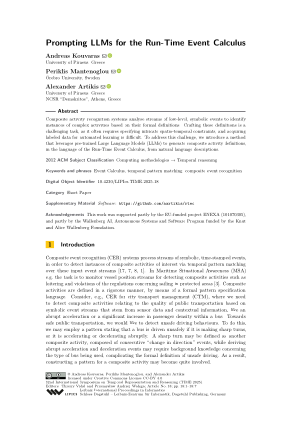Prompting LLMs for the Run-Time Event Calculus (Short Paper)
Authors
Andreas Kouvaras  ,
Periklis Mantenoglou
,
Periklis Mantenoglou  ,
Alexander Artikis
,
Alexander Artikis 
-
Part of:
Volume:
32nd International Symposium on Temporal Representation and Reasoning (TIME 2025)
Part of: Series: Leibniz International Proceedings in Informatics (LIPIcs)
Part of: Conference: International Symposium on Temporal Representation and Reasoning (TIME) - License:
 Creative Commons Attribution 4.0 International license
Creative Commons Attribution 4.0 International license
- Publication Date: 2025-10-13
File

PDF
LIPIcs.TIME.2025.18.pdf
- Filesize: 0.67 MB
- 7 pages
Document Identifiers
Subject Classification
ACM Subject Classification
- Computing methodologies → Temporal reasoning
Keywords
- Event Calculus
- temporal pattern matching
- composite event recognition
Metrics
- Access Statistics
-
Total Accesses (updated on a weekly basis)
0PDF Downloads0Metadata Views
Abstract
Composite activity recognition systems analyse streams of low-level, symbolic events to identify instances of complex activities based on their formal definitions. Crafting these definitions is a challenging task, as it often requires specifying intricate spatio-temporal constraints, and acquiring labeled data for automated learning is difficult. To address this challenge, we introduce a method that leverages pre-trained Large Language Models (LLMs) to generate composite activity definitions, in the language of the Run-Time Event Calculus, from natural language descriptions.
Cite As Get BibTex
Andreas Kouvaras, Periklis Mantenoglou, and Alexander Artikis. Prompting LLMs for the Run-Time Event Calculus (Short Paper). In 32nd International Symposium on Temporal Representation and Reasoning (TIME 2025). Leibniz International Proceedings in Informatics (LIPIcs), Volume 355, pp. 18:1-18:7, Schloss Dagstuhl – Leibniz-Zentrum für Informatik (2025)
https://doi.org/10.4230/LIPIcs.TIME.2025.18
BibTex
@InProceedings{kouvaras_et_al:LIPIcs.TIME.2025.18,
author = {Kouvaras, Andreas and Mantenoglou, Periklis and Artikis, Alexander},
title = {{Prompting LLMs for the Run-Time Event Calculus}},
booktitle = {32nd International Symposium on Temporal Representation and Reasoning (TIME 2025)},
pages = {18:1--18:7},
series = {Leibniz International Proceedings in Informatics (LIPIcs)},
ISBN = {978-3-95977-401-7},
ISSN = {1868-8969},
year = {2025},
volume = {355},
editor = {Vidal, Thierry and Wa{\l}\k{e}ga, Przemys{\l}aw Andrzej},
publisher = {Schloss Dagstuhl -- Leibniz-Zentrum f{\"u}r Informatik},
address = {Dagstuhl, Germany},
URL = {https://drops.dagstuhl.de/entities/document/10.4230/LIPIcs.TIME.2025.18},
URN = {urn:nbn:de:0030-drops-244641},
doi = {10.4230/LIPIcs.TIME.2025.18},
annote = {Keywords: Event Calculus, temporal pattern matching, composite event recognition}
}
Author Details
Acknowledgements
This work was supported partly by the EU-funded project ENEXA (101070305), and partly by the Wallenberg AI, Autonomous Systems and Software Program funded by the Knut and Alice Wallenberg Foundation.
Supplementary Materials
- Software https://github.com/aartikis/rtec
References
- Elias Alevizos, Alexander Artikis, and Georgios Paliouras. Complex event recognition with symbolic register transducers. Proc. VLDB Endow., 17(11):3165-3177, 2024. URL: https://doi.org/10.14778/3681954.3681991.
- Alexander Artikis, Marek J. Sergot, and Georgios Paliouras. An event calculus for event recognition. IEEE Trans. Knowl. Data Eng., 27(4):895-908, 2015. URL: https://doi.org/10.1109/TKDE.2014.2356476.
- Alexander Artikis and Dimitris Zissis, editors. Guide to Maritime Informatics. Springer, 2021. URL: https://doi.org/10.1007/978-3-030-61852-0.
- Iliano Cervesato and Angelo Montanari. A calculus of macro-events: Progress report. In TIME, pages 47-58, 2000. URL: https://doi.org/10.1109/TIME.2000.856584.
- Luca Chittaro and Angelo Montanari. Efficient temporal reasoning in the cached event calculus. Comput. Intell., 12:359-382, 1996. URL: https://doi.org/10.1111/J.1467-8640.1996.TB00267.X.
- Lars George, Bruno Cadonna, and Matthias Weidlich. Il-miner: Instance-level discovery of complex event patterns. Proc. VLDB Endow., 10(1):25-36, 2016. URL: https://doi.org/10.14778/3015270.3015273.
- Nikos Giatrakos, Elias Alevizos, Alexander Artikis, Antonios Deligiannakis, and Minos N. Garofalakis. Complex event recognition in the big data era: a survey. VLDB J., 29(1):313-352, 2020. URL: https://doi.org/10.1007/S00778-019-00557-W.
- Alejandro Grez, Cristian Riveros, Martín Ugarte, and Stijn Vansummeren. A formal framework for complex event recognition. ACM Trans. Database Syst., 46(4):16:1-16:49, 2021. URL: https://doi.org/10.1145/3485463.
- Nikos Katzouris, Georgios Paliouras, and Alexander Artikis. Online learning probabilistic event calculus theories in answer set programming. Theory Pract. Log. Program., 23(2):362-386, 2023. URL: https://doi.org/10.1017/S1471068421000107.
- R. Kowalski and M. Sergot. A logic-based calculus of events. New Gen. Computing, 4(1):67-96, 1986. URL: https://doi.org/10.1007/BF03037383.
- Periklis Mantenoglou and Alexander Artikis. Extending the range of temporal specifications of the run-time event calculus. In TIME, volume 318, pages 6:1-6:14, 2024. URL: https://doi.org/10.4230/LIPICS.TIME.2024.6.
- Periklis Mantenoglou and Alexander Artikis. Temporal specification optimisation for the event calculus. In AAAI-25, pages 15075-15082, 2025. URL: https://doi.org/10.1609/AAAI.V39I14.33653.
- Periklis Mantenoglou, Dimitrios Kelesis, and Alexander Artikis. Complex event recognition with allen relations. In KR, pages 502-511, 2023. URL: https://doi.org/10.24963/KR.2023/49.
-
Periklis Mantenoglou, Manolis Pitsikalis, and Alexander Artikis. Stream reasoning with cycles. In KR, pages 544-553, 2022.

- Evangelos Michelioudakis, Alexander Artikis, and Georgios Paliouras. Online semi-supervised learning of composite event rules by combining structure and mass-based predicate similarity. Mach. Learn., 113(3):1445-1481, 2024. URL: https://doi.org/10.1007/S10994-023-06447-1.
- Georgios M. Santipantakis, Akrivi Vlachou, Christos Doulkeridis, Alexander Artikis, Ioannis Kontopoulos, and George A. Vouros. A stream reasoning system for maritime monitoring. In TIME, volume 120, pages 20:1-20:17, 2018. URL: https://doi.org/10.4230/LIPICS.TIME.2018.20.
- Walker M. White, Mirek Riedewald, Johannes Gehrke, and Alan J. Demers. What is "next" in event processing? In PODS, pages 263-272, 2007. URL: https://doi.org/10.1145/1265530.1265567.
